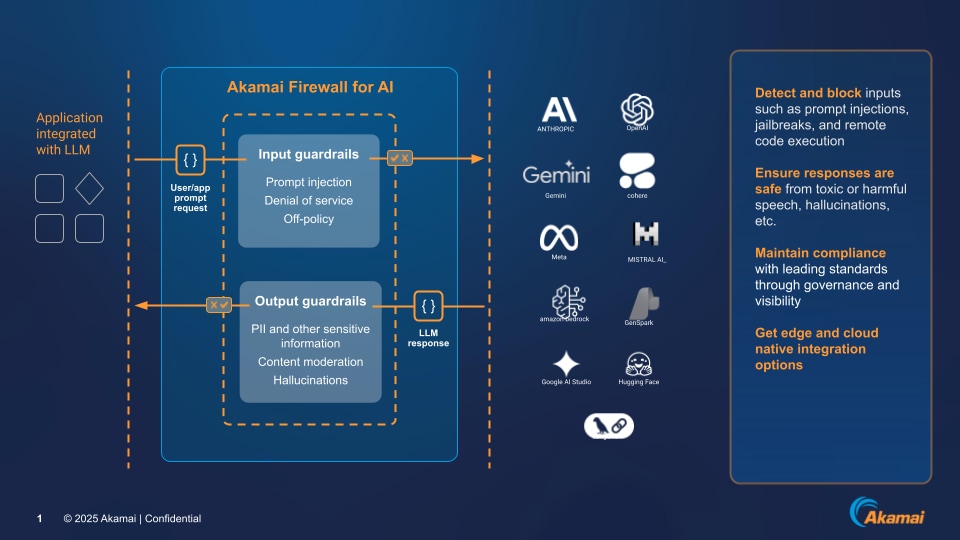Akamai Firewall for AI: Get Powerful Protection for New LLM App Threats
Organizations globally are turning to artificial intelligence (AI) to help drive their businesses forward by looking for productivity enhancements, process improvements, and cost cutting. One of the most prevalent forms of AI being used are large language models (LLMs), which companies are deploying to answer customer questions and provide tailored information to questions, among other benefits.
AI models and LLMs are vulnerable to attacks
However, along with the benefits of LLMs come new risks and threats. AI models contain valuable proprietary knowledge and sensitive datasets, making them prime targets for attackers. LLMs are vulnerable to new and unique types of attacks, including:
Prompt injection attacks — Attackers manipulate AI-generated responses to leak sensitive data or bypass security measures.
AI-specific denial-of-service (DoS) attacks — Adversaries flood AI models with high-volume queries, leading to resource exhaustion.
Toxic output and hallucinations — AI models generate misleading, biased, or offensive content, leading to reputational risks.
Data exfiltration and model theft — Attackers attempt to extract proprietary knowledge from AI models.
Compliance and governance challenges — Industry guidance like OWASP Top 10 for LLMs demand greater oversight.
Cybersecurity teams need to protect their organizations without slowing down the innovation and productivity enhancements coming from LLMs. And they can’t harm their customers’ experiences, either. But traditional security measures aren’t built to defend against the new threats. They need protections specially designed to detect and mitigate LLMs attacks.
Protect the integrity, safety, and reliability of AI applications
Today, we’re announcing Akamai Firewall for AI, a purpose-built security solution designed to protect AI-powered applications, LLMs, and AI-driven APIs from emerging cyberthreats. By securing both inbound AI queries and outbound AI responses, Firewall for AI closes critical security gaps introduced by generative AI.
With real-time threat detection, policy-based enforcement, and adaptive security measures, the firewall defends against prompt injections, sensitive data leaks, adversarial exploits, and AI-specific DoS attacks. As a result, it protects the integrity, safety, and reliability of AI-driven innovation.
Specialized features
Key specialized features of Firewall for AI include:
- Multi-layered protection: Blocks adversarial inputs, unauthorized queries, and large-scale data scraping to prevent model manipulation and data exfiltration
Real-time AI threat detection: Uses adaptive security rules to dynamically respond to evolving AI-based attacks, including prompt injection and model exploitation
Compliance and data protection: Ensures that AI-generated outputs remain safe and align with regulatory and industry standards
Flexible deployment options: Deploys via the Akamai edge, REST API, or reverse proxy, enabling seamless integration into existing security frameworks
- Proactive risk mitigation: Filters AI outputs to prevent toxic content, hallucinations, and unauthorized data leaks
How it works
Firewall for AI inspects inputs and outputs, ensuring that your security guardrails stay intact by detecting and blocking malicious prompts and delivering only safe, trusted responses (Figure).
For example, Firewall for AI reviews LLM prompts for attempts to manipulate the LLM, such as prompt phrasing designed to circumvent the LLM’s privacy or safety guardrails. Similarly, it inspects responses from the LLM before they reach your users, which helps prevent the exposure of sensitive data like customer account numbers.
As AI becomes integrated into your core business applications, this level of inspection can easily fit into your application testing process, strengthening trust and reliability at every step.
Learn more
Get more details on how Akamai Firewall for AI can protect LLMs without slowing down your business.



